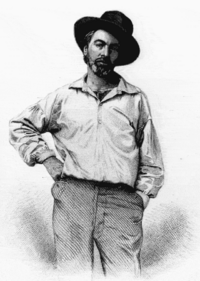Leaves of Grass facts for kids

Walt Whitman, age 37, frontispiece to Leaves of Grass
|
|
| Author | Walt Whitman |
|---|---|
| Country | United States |
| Language | English |
| Genre | Poetry |
| Publisher | Self |
|
Publication date
|
July 4, 1855 |
| Media type | |
Leaves of Grass is a very important collection of poems written by the American poet Walt Whitman (1819–1892). This book was first published on July 4, 1855. It was printed in Brooklyn, New York.
The first edition was a small book. It had only 95 pages and contained 12 poems. About 800 copies were printed. Walt Whitman paid for this first printing himself. Even though not many copies sold at first, Whitman was not discouraged.
About Leaves of Grass
The first copy of Leaves of Grass was sent to a famous writer named Ralph Waldo Emerson. Emerson had inspired Whitman to create the book. Emerson wrote a very kind letter back to Whitman. He said it was "the most extraordinary piece of wit and wisdom America has yet contributed." He also wrote that reading it made him "very happy."
Growing Over Time
Walt Whitman spent most of his life working on Leaves of Grass. He kept writing and rewriting the poems. He also added new ones. He revised the book many times until he died. Some people say there were six different versions of the book. Others say there were nine.
The most well-known poems in the collection include "Song of Myself" and "When Lilacs Last in the Dooryard Bloom'd." At the time, most poetry focused on religious ideas. But Whitman's collection was different. It celebrated the human body and the natural world. It also praised the experience of our senses.
By the time Whitman finished his last edition, the book had grown a lot. It started with 12 poems. But the final version had almost 400 poems. The pictures in the book also changed over time. The last edition showed an older Whitman with a full beard.
Why is it Important?
Leaves of Grass is considered one of the most important collections of American poetry. Because of this, different groups have used Whitman's work for their own goals. They used his ideas to support their political and social causes.
For example:
- In the early 1900s, a popular series of small books called Little Blue Books shared Whitman's work. This series helped more people discover his poems. The Little Blue Books often supported ideas about fairness for everyone. They connected Whitman's focus on everyday people to helping the working class.
- During World War II, the American government gave Whitman's poems to soldiers for free. They believed his poems celebrated the "American Way." They hoped this would inspire the soldiers protecting the country.
Images for kids
-
Frontispiece of the 1883 edition
See also
 In Spanish: Hojas de hierba para niños
In Spanish: Hojas de hierba para niños
 | Bayard Rustin |
 | Jeannette Carter |
 | Jeremiah A. Brown |


